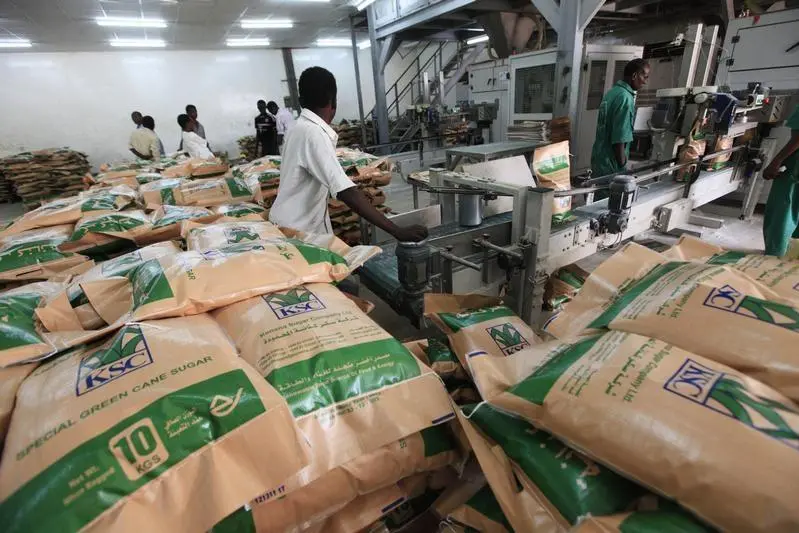PHOTO
* Rising migration boosts consumption requirement
* Indian, Thai white sugar flows to Sudan
* EU seen competing to supply Sudan after quotas dismantled
By David Brough and Jonathan Saul
LONDON, Nov 4 (Reuters) - The risk of pirate attacks off the Horn of Africa and booming domestic demand have helped to turn Sudan into one of the world's biggest white sugar importers this year.
The country's growing population, plus inflows of people fleeing conflicts in the region, have driven up white sugar consumption, currently estimated at around 1.5 million tonnes annually, according to the International Sugar Organization (ISO).
European trade sources said Sudan's imports had increased by at least 200,000 tonnes this year, above an annual average of around 950,000 tonnes, contributing to a tightening in the global white sugar market.
"Sudan has been a surprise to the upside this year," a European commodities trade source said.
"We have seen the bigger suppliers, who need to place their large cargoes, active in Sudan this year. There is significant domestic demand for refined sugar."
Part of the reason is that Port Sudan on the Red Sea has attractions for shippers seeking to avoid pirates off the Horn of Africa.
Trade sources said international navies, the deployment of armed private security guards and defensive measures onboard merchant ships had helped to stop attacks by Somali pirates.
But they also said that some suppliers still preferred to use Port Sudan - the region's major terminal - to avoid deliveries in areas that were previously big piracy hot spots.
"Political instability in Somalia and illegal fishing off its coast by a range of countries mean that a return to piracy by some of those worse affected is a real possibility," Gerry Northwood, chief operations officer with maritime security company MAST, said.
As a result, Sudan is seen as a ready market for leading trade houses that have large tonnages of white sugar to unload.
Sergey Gudoshnikov, a senior economist at the London-based ISO, estimated that around 20 percent of the imported sugar was re-exported to neighbouring countries via Sudan's highly porous borders.
A Middle East-based commodities trade source said: "Sudan can act as a supplier to neighbouring countries such as Eritrea, Djibouti, and also landlocked countries Ethiopia and Central African Republic."
Suppliers of Indian and Thai white sugar have shipped cargoes to Sudan, while Dubai's Al Khaleej refinery was seen as competing for business in Sudan after losing market share in Iraq since the Etihad refinery there came onstream earlier this year.
Gudoshnikov said that while Sudan's 400,000 tonnes-a-year capacity Kenana cane mill was working steadily for the domestic market, the country's White Nile mill was believed to be operating at a small fraction of its capacity, boosting opportunities for imports.
He said expectations of increased exports from the European Union, after production quotas end in 2017, pointed to increased competition in white sugar trade to Sudan.
(Editing by Jane Merriman) ((David.Brough@thomsonreuters.com; 00442075428064; Reuters Messaging: david.brough.thomsonreuters.com@reuters.net))
Keywords: SUDAN SUGAR IMPORTS
* Indian, Thai white sugar flows to Sudan
* EU seen competing to supply Sudan after quotas dismantled
By David Brough and Jonathan Saul
LONDON, Nov 4 (Reuters) - The risk of pirate attacks off the Horn of Africa and booming domestic demand have helped to turn Sudan into one of the world's biggest white sugar importers this year.
The country's growing population, plus inflows of people fleeing conflicts in the region, have driven up white sugar consumption, currently estimated at around 1.5 million tonnes annually, according to the International Sugar Organization (ISO).
European trade sources said Sudan's imports had increased by at least 200,000 tonnes this year, above an annual average of around 950,000 tonnes, contributing to a tightening in the global white sugar market.
"Sudan has been a surprise to the upside this year," a European commodities trade source said.
"We have seen the bigger suppliers, who need to place their large cargoes, active in Sudan this year. There is significant domestic demand for refined sugar."
Part of the reason is that Port Sudan on the Red Sea has attractions for shippers seeking to avoid pirates off the Horn of Africa.
Trade sources said international navies, the deployment of armed private security guards and defensive measures onboard merchant ships had helped to stop attacks by Somali pirates.
But they also said that some suppliers still preferred to use Port Sudan - the region's major terminal - to avoid deliveries in areas that were previously big piracy hot spots.
"Political instability in Somalia and illegal fishing off its coast by a range of countries mean that a return to piracy by some of those worse affected is a real possibility," Gerry Northwood, chief operations officer with maritime security company MAST, said.
As a result, Sudan is seen as a ready market for leading trade houses that have large tonnages of white sugar to unload.
Sergey Gudoshnikov, a senior economist at the London-based ISO, estimated that around 20 percent of the imported sugar was re-exported to neighbouring countries via Sudan's highly porous borders.
A Middle East-based commodities trade source said: "Sudan can act as a supplier to neighbouring countries such as Eritrea, Djibouti, and also landlocked countries Ethiopia and Central African Republic."
Suppliers of Indian and Thai white sugar have shipped cargoes to Sudan, while Dubai's Al Khaleej refinery was seen as competing for business in Sudan after losing market share in Iraq since the Etihad refinery there came onstream earlier this year.
Gudoshnikov said that while Sudan's 400,000 tonnes-a-year capacity Kenana cane mill was working steadily for the domestic market, the country's White Nile mill was believed to be operating at a small fraction of its capacity, boosting opportunities for imports.
He said expectations of increased exports from the European Union, after production quotas end in 2017, pointed to increased competition in white sugar trade to Sudan.
(Editing by Jane Merriman) ((David.Brough@thomsonreuters.com; 00442075428064; Reuters Messaging: david.brough.thomsonreuters.com@reuters.net))
Keywords: SUDAN SUGAR IMPORTS





















